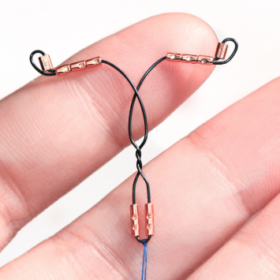
Your guide to contraception that can stop periods
In this article
What's the lowdown?
Combined hormonal contraception can stop periods if you take it back-to-back
Progestogen-only methods of contraception can also be used to stop periods, but this is more unpredictable and can’t be guaranteed
You can use period delay tablets to prevent a period for a short amount of time
Many of us love contraception that can stop periods. From saving on sanitary products, to allowing us more time in the swimming pool, having no periods offers great advantages, especially if you suffer from heavy periods or reproductive health issues like fibroids, endometriosis or adenomyosis.
How can contraception stop your period?
Hormonal contraception can stop your period. The synthetic hormones used in contraception thin out the womb lining and stop ovulation (release of an egg) each month. Without releasing an egg, you no longer have a menstrual cycle and the thin lining means you don’t need to have a period.
In some users, periods stop very quickly depending on the type of contraception you use. In others, it can take longer, and it’s not guaranteed.
What contraceptive method do doctors usually recommend if you want to stop your periods?
Combined hormonal contraception such as the pill, patch or vaginal ring are excellent choices to stop periods, so these are often recommended. However not everyone can use combined methods of contraception. If you cannot use synthetic oestrogen due to your age or medical history, progestogen-only methods can also stop your periods. These may include the progestogen-only pill, injection, implant or hormonal coil.
Can the contraceptive pill stop periods?
Yes, you can use a contraceptive pill to stop periods. Let’s take a look at the types of contraceptive pills that stop periods.
Combined pill
If you are taking the combined pill and have a break of up to seven days every month, or every few months, you will usually have a withdrawal bleed during the break. Sometimes, when people have used the pill for a long time, the womb lining can become so thin that they may not even have a withdrawal bleed during the break, although this is less common.
The combined pill can be used to stop your period. To do this, you need to take the combined pill continuously, also known as taking it back-to-back, which means not taking the break. By doing this, you avoid the withdrawal bleed which is caused when you stop taking the synthetic hormones in the pill.
Mini pill
For some users, the mini pill (or progestogen-only pill) can cause your periods to stop. As of data collected up to October 2024, 43% of Lowdown reviewers said the progestogen-only pill stopped their periods.
Does the patch stop periods?
As the patch is a type of combined hormonal contraceptive, just like the combined pill, you can use it back-to-back to stop bleeds and have no periods. If you use it in the traditional way and have a break each month, you will usually still bleed.
Does the vaginal ring stop periods?
Yes, the vaginal ring can stop periods. If you have a break each month while using the vaginal ring, you’d usually still have a bleed. However, if you use it back-to-back, you can avoid bleeds and stop periods.
Does the contraceptive implant stop your periods?
For some people, the implant can stop periods. Of The Lowdown users, this is around a third (data as of October 2024). However, other people can find that the implant makes their periods more irregular, longer or sometimes even heavier. Not ideal. And the most annoying thing is that we can’t predict whose period will stop and whose won’t. Furthermore, just because you’ve had no periods while using the implant for 2,3 or even 6 years, it doesn’t mean they won’t restart. Bleeding patterns with the implant are unpredictable!
Can the contraceptive injection stop periods?
Yes, the contraceptive injection can stop periods. Research shows that after 12 months of using the injection, around 50% of users won’t have any bleeds. Lowdown reviewers are lucky, as 69% of you report that the injection stopped your periods (data as of October 2024). However, as with the implant, it’s not possible to predict which women will continue to have periods and who will stop.
Does the coil stop periods?
There are 2 types of coil or IUD; the hormonal coil or the copper coil.
Can the hormonal coil stop periods?
Yes, the hormonal coil can stop periods. In fact, hormonal coil brands such as the Mirena, Benilexa or Levosert are used to treat heavy periods by reducing or stopping bleeds. Other hormonal coil brands such as the Kyleena or Jaydess, may stop periods, but for a smaller number of users.
| Brand of coil | Percentage of Lowdown users whose periods stopped |
| Mirena | 52% (278 out of 531) |
| Levosert | 44% (6 out of 23) |
| Benilexa | Only 1 review so far…share yours? |
| Kyleena | 32% (39 out of 121) |
| Jaydess | 34% (35 out of 102) |
Data taken as of October 2024
It’s important to know that the hormonal coils might not stop your periods immediately. Some people can have spotting or bleeding for 3 to 6 months after the coil has been inserted, and it can take up to a year before bleeding stops altogether.
Can the copper coil stop periods?
The copper coil does not stop periods. With the copper coil you will continue to ovulate and have a menstrual cycle. Unfortunately, a side effect of the copper coil can be longer, heavier or more painful periods.
How can I stop my period?
If you’d like to stop your periods, you have different options. If it’s for a short time, such as over a holiday, you can use hormonal pills to delay your period. We have an article dedicated to tips for delaying your period.
If you want to stop your periods for a longer time, hormonal contraceptives can be a great option. To work out the best option for you, use our recommender quiz and check out our Lowdown reviews.
Our medical review process
This article has been medically reviewed for factual and up to date information by a Lowdown doctor.







